
Wagyu Integrity
Integrity is the key value for the New Zealand Wagyu Breeders Association Inc.
The importance of accurate and verifiable records, transparency and honesty cannot be over emphasized. This applies in all the areas the NZWBA operates.
The accurate identification and description of our cattle is the foundation on which the above stands. Whether it be a buyer of our livestock or a customer buying some of our beef, the basics are the same. For example; first cross animals are a long way genetically from full blood ones in terms of value and meat quality. They should not both be called Wagyu; F1‘s have only 50% Wagyu genetics. Therefore, first cross cattle are crossbred Wagyu or F1.
For the cattle to be called Wagyu, they would need to be purebred or full blood…see the diagrams below.
In order to maintain good standards as an association, the main areas of interests are:
- Authentic herd records backed by accurate field records or DNA parentage tests
- Buying and selling of stock with Wagyu genetics
- Trading of genetic material such as embryos and semen
- Marketing, promotion and branding of beef from crossbred to full blood
The New Zealand Wagyu Breeders Association advocates ethical quality standards in the Wagyu industry. We recommend standards advocated by the Australian Meat Industry Language and Standards Committee of AUS-MEAT, and JMGA (Japanese Meat Grading Association) Beef Carcass Grading Standards.
Wagyu Breed Trade Descriptions
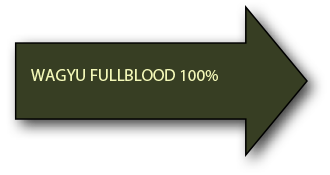
Wagyu Full-Blood sire and dams who shows no evidence of cross-breeding with other breeds and whose pedigree can be traced back to Japan providing 100% Full-Blood Wagyu beef.
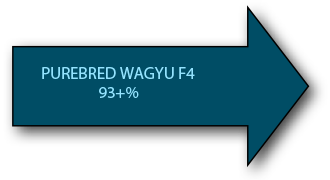
Wagyu genetic content is greater than 93%. This is the fourth generation of breeding up from the original first cross. An F4 comes from the mating of a Wagyu Full-Blood sire and a Crossbred Wagyu F3 dam.
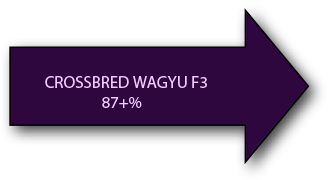
Wagyu genetic content is greater than 87%. This is the third generation of breeding up from the original first cross. An F3 comes from the mating of a Wagyu Full-Blood sire and a Crossbred Wagyu F2 dam. Has greater than 87% Wagyu genetic content. This is the result of at least three generations of crossbreeding, using a Wagyu Fullblood sire, and a crossbred Wagyu F2 dam.
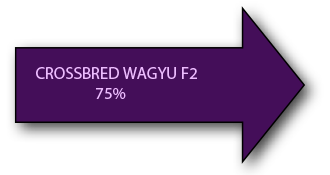
Wagyu genetic content is 75% or higher. This is the second generation of breeding up from the original first cross. An F2 comes from the mating of a Wagyu Full-Blood sire and a Crossbred Wagyu F1 dam.
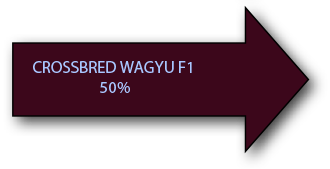
Wagyu genetic content is 50% or higher. This is the first generation of breeding up from the original first cross. An F1 comes from the mating of a Wagyu Full-Blood sire and another breed.
